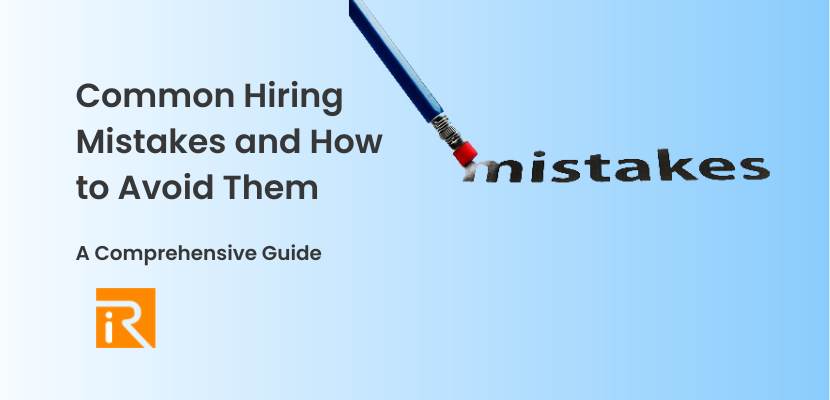
- Why is it important to avoid hiring mistakes?
-
Common Hiring Mistakes and How to Avoid Them
- Neglecting Job Descriptions: The Importance of Clear Communication
- Relying Solely on Traditional Recruitment Methods: Embrace Diversity
- Skipping Background Checks: Verify Before You Hire
- Rushing the Interview Process: Take Your Time
- Ignoring Cultural Fit: Beyond Skills and Experience
- Overlooking Soft Skills: The Power of Emotional Intelligence
- Neglecting Candidate Experience: Create a Positive Impression
- Failing to Involve Key Stakeholders: Collaborate for Success
- Not Conducting Skills Assessments: Test Competencies
- Lack of Onboarding Support: Set New Hires Up for Success
-
Frequently Asked Questions (FAQs)
- Q1: What are the most common mistakes employers make during the hiring process?
- Q2: How can I avoid making these common hiring mistakes?
- Q3: Why is cultural fit important in the hiring process?
- Q4: How can I assess soft skills during interviews?
- Q5: What is the importance of a positive candidate experience?
- Q6: How can involving key stakeholders improve the hiring process?
- Conclusion
Hiring the right talent is crucial for any organization’s success. However, it’s not uncommon for employers to make mistakes during the hiring process that can lead to poor hiring decisions and costly consequences. In this comprehensive guide, we will delve into the common hiring mistakes made by employers and provide valuable insights on how to avoid them. Whether you’re a seasoned recruiter or a business owner hiring for the first time, this article will equip you with the knowledge and strategies needed to build a talented and high-performing team.
Why is it important to avoid hiring mistakes?
Avoiding hiring mistakes is crucial for several reasons. Here’s why it is important to steer clear of these pitfalls:
-
Cost and Productivity
Hiring mistakes can be expensive for organizations. Bringing in the wrong candidate can result in wasted resources, such as time spent on training and onboarding, and the need to repeat the hiring process. Moreover, an ill-suited employee can have a negative impact on team dynamics and overall productivity.
-
Employee Morale
Hiring mistakes can affect the morale and motivation of existing employees. When an unfit candidate is hired, it can create tension and disrupt the harmony within the team. Existing employees may feel burdened with additional workload or demoralized by working with someone who does not meet expectations.
-
Reputation and Employer Branding
Poor hiring decisions can tarnish an organization’s reputation and employer brand. Word travels fast, and if candidates have negative experiences during the hiring process or hear about missteps in recruitment, it can deter top talent from applying in the future. Conversely, a reputation for making sound hiring decisions can attract high-quality candidates.
-
Retention and Turnover
Hiring mistakes often lead to high turnover rates. If employees feel mismatched with their roles or the company culture, they are more likely to seek alternative opportunities. High turnover can disrupt workflow, increase recruitment costs, and hinder the organization’s ability to build a stable and cohesive team.
-
Skill and Talent Gap
When hiring mistakes occur, organizations miss out on the opportunity to bring in candidates with the right skills and expertise. This can result in a skill and talent gap within the organization, hindering growth and innovation. Hiring the right people ensures that the organization has the necessary capabilities to thrive and remain competitive.
-
Long-Term Success
Making effective hiring decisions is vital for the long-term success of an organization. By selecting candidates who align with the company’s values, possess the required skills, and fit well within the existing team, organizations can build a strong and cohesive workforce. This, in turn, fosters a positive work environment, boosts employee engagement, and drives overall success.
Common Hiring Mistakes and How to Avoid Them
-
Neglecting Job Descriptions: The Importance of Clear Communication
The first step in any successful hiring process is creating a well-crafted job description. Many employers make the mistake of underestimating the importance of a clear and detailed job description. A vague or poorly written job description can attract the wrong candidates and lead to confusion during the selection process. To avoid this, ensure that your job descriptions clearly outline the key responsibilities, required qualifications, and expectations for the role. Be specific and use action-oriented language to attract the right candidates.
-
Relying Solely on Traditional Recruitment Methods: Embrace Diversity
One common mistake made by employers is relying solely on traditional recruitment methods, such as posting job openings on job boards or relying on employee referrals. While these methods can be effective, they often limit the pool of candidates and hinder diversity in the workforce. To avoid this, explore alternative recruitment channels, such as professional networks, industry events, and social media platforms. Embrace diversity and actively seek candidates from different backgrounds and experiences to foster a more inclusive workplace.
-
Skipping Background Checks: Verify Before You Hire
Skipping background checks is a costly mistake that many employers make in the hiring process. Neglecting to verify a candidate’s credentials, employment history, and references can lead to hiring unqualified or dishonest individuals. Take the time to conduct thorough background checks to ensure the accuracy of the information provided by candidates. This will help you make informed decisions and mitigate potential risks.
-
Rushing the Interview Process: Take Your Time
The interview process is a crucial stage in evaluating candidates, yet many employers make the mistake of rushing through it. Conducting hasty interviews can result in overlooking important factors and making poor hiring decisions. Instead, take your time to prepare a structured interview process, including a set of relevant questions and assessment criteria. Allow candidates to showcase their skills and personality, and actively listen to their responses. Investing time in the interview process will help you identify the best fit for your organization.
-
Ignoring Cultural Fit: Beyond Skills and Experience
Skills and experience are undoubtedly important, but ignoring cultural fit is a mistake that can lead to team dysfunction and high turnover rates. Hiring individuals who align with your company’s values, mission, and work culture is essential for long-term success. During the interview process, evaluate candidates not only based on their technical capabilities but also on their ability to adapt to your organization’s work environment. Assess their communication style, teamwork skills, and problem-solving approach to ensure a good cultural fit.
-
Overlooking Soft Skills: The Power of Emotional Intelligence
In the quest for technical proficiency, employers often overlook the importance of soft skills, especially emotional intelligence. Soft skills, such as communication, leadership, and empathy, play a vital role in fostering a positive and productive work environment. To avoid this mistake, incorporate behavioral-based questions in your interview process to assess candidates’ soft skills. Ask situational questions that require candidates to demonstrate their problem-solving abilities, teamwork skills, and emotional intelligence. By placing importance on soft skills, you can ensure that you hire individuals who not only have the technical know-how but also the interpersonal skills to thrive in your organization.
-
Neglecting Candidate Experience: Create a Positive Impression
The hiring process is a two-way street, and many employers make the mistake of neglecting the candidate experience. Providing a positive and engaging experience to candidates is crucial, as it reflects your organization’s values and culture. Avoid long and complicated application processes, respond promptly to candidate inquiries, and provide timely feedback after interviews. Remember, even if a candidate is not the right fit for the current role, they may be a potential fit in the future or could refer other talented individuals to your organization. Treat all candidates with respect and professionalism.
-
Failing to Involve Key Stakeholders: Collaborate for Success
Another common hiring mistake is failing to involve key stakeholders in the decision-making process. Hiring decisions shouldn’t rest solely on the shoulders of the hiring manager or HR department. It’s essential to involve relevant team members, such as department heads or future colleagues, in the interview and evaluation process. Their input and perspectives can provide valuable insights and ensure a more comprehensive assessment of candidates.
-
Not Conducting Skills Assessments: Test Competencies
Relying solely on resumes and interviews to assess a candidate’s skills can be risky. Employers often make the mistake of not conducting skills assessments or tests tailored to the specific job requirements. Incorporate practical assessments or assignments that allow candidates to showcase their abilities and problem-solving skills. This will provide a more accurate measure of their competencies and help you make informed hiring decisions.
-
Lack of Onboarding Support: Set New Hires Up for Success
Many employers underestimate the importance of a robust onboarding process, which can lead to early employee disengagement and turnover. Failing to provide proper onboarding support leaves new hires feeling lost and disconnected from the organization. To avoid this, develop a comprehensive onboarding program that includes introducing new hires to company policies, procedures, and team members. Provide training and mentorship to help them quickly integrate into their roles. A well-structured onboarding process sets new employees up for success and enhances their long-term retention.
Frequently Asked Questions (FAQs)
Q1: What are the most common mistakes employers make during the hiring process?
A1: The most common hiring mistakes include neglecting job descriptions, relying solely on traditional recruitment methods, skipping background checks, rushing the interview process, ignoring cultural fit, overlooking soft skills, neglecting candidate experience, failing to involve key stakeholders, not conducting skills assessments, and lacking proper onboarding support.
Q2: How can I avoid making these common hiring mistakes?
A2: To avoid these common hiring mistakes, ensure clear communication through well-crafted job descriptions, embrace diversity in recruitment methods, conduct thorough background checks, take your time during the interview process, prioritize cultural fit and soft skills, provide a positive candidate experience, involve key stakeholders, conduct skills assessments, and implement a robust onboarding process.
Q3: Why is cultural fit important in the hiring process?
A3: Cultural fit is important in the hiring process because it ensures that new hires align with the organization’s values, work culture, and team dynamics. Hiring individuals who fit well culturally promotes better collaboration, reduces conflicts, and enhances employee engagement and retention.
Q4: How can I assess soft skills during interviews?
A4: Assessing soft skills during interviews can be done by asking behavioral-based questions that require candidates to provide real-life examples of their problem-solving, teamwork, communication style, and emotional intelligence. Ask questions like, “Tell me about a time when you had to resolve a conflict within a team,” or “Describe a situation where you had to navigate a challenging communication issue.” By asking these types of questions, you can gauge a candidate’s ability to demonstrate soft skills in action.
Q5: What is the importance of a positive candidate experience?
A5: A positive candidate experience is crucial for several reasons. Firstly, it reflects your organization’s values and professionalism, which can enhance your employer brand and attract top talent. Secondly, candidates who have a positive experience are more likely to speak positively about your company, even if they were not selected for the position. This can lead to referrals and an expanded pool of qualified candidates in the future. Lastly, providing a positive candidate experience fosters goodwill and shows respect for candidates’ time and effort.
Q6: How can involving key stakeholders improve the hiring process?
A6: Involving key stakeholders in the hiring process brings multiple benefits. Firstly, it provides a more holistic evaluation of candidates by incorporating diverse perspectives. Each stakeholder can assess candidates based on their specific area of expertise and team fit. Secondly, involving key stakeholders promotes transparency and collaboration within the organization, as decisions are made collectively. Lastly, it helps build buy-in from the team, as they feel valued and included in the decision-making process.
Conclusion
Hiring the right talent is a critical factor in the success of any organization. By being aware of the common hiring mistakes and implementing effective strategies to avoid them, employers can significantly improve their hiring process and increase the likelihood of making successful hires. Clear communication through job descriptions, embracing diversity in recruitment methods, conducting thorough assessments, and prioritizing cultural fit and soft skills are all essential components of a robust hiring process.
Remember to provide a positive candidate experience, involve key stakeholders, and invest in a comprehensive onboarding program to set new hires up for success. By avoiding common hiring mistakes and adopting best practices, you can attract and retain top talent, foster a positive work environment, and drive the long-term success of your organization.


























